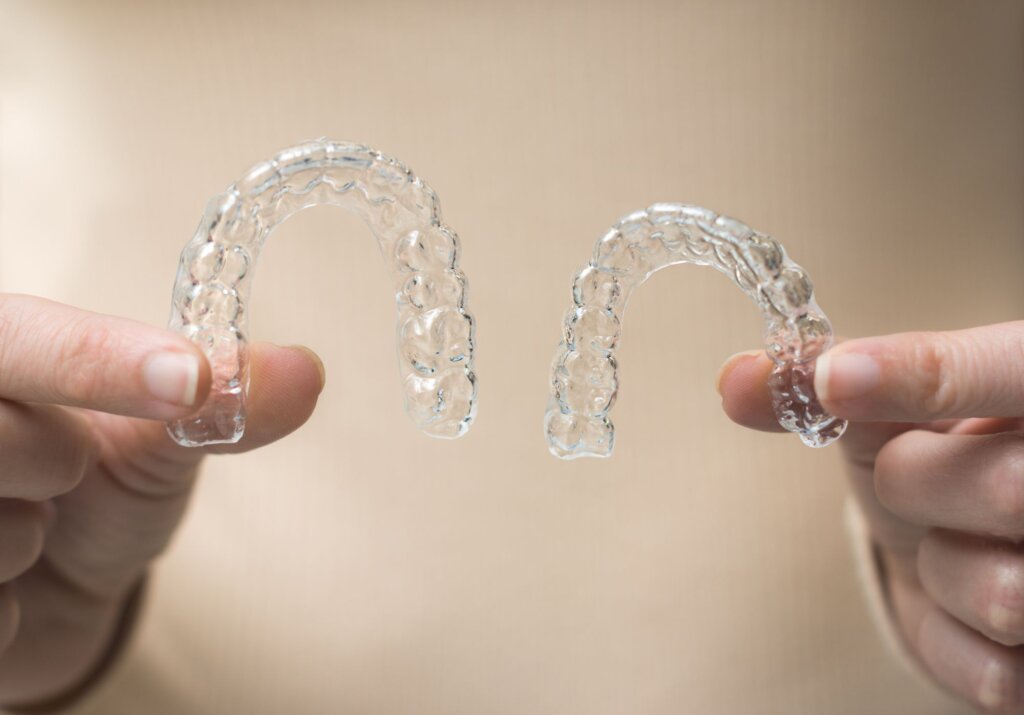Waking up with a sore jaw or frequent headaches might not seem like a dental issue, but these could be signs that you’re grinding your teeth at night. Nighttime teeth grinding—also known as “bruxism”—is a common condition that can lead to jaw pain, TMJ issues, tooth damage, and other oral health problems
Luckily, a night guard can help protect your teeth and relieve discomfort. Is it time for you to get one? Here are five signs it might be time to talk to your dentist about a night guard.
1. Jaw Pain or Soreness After Waking Up
If your jaw feels tight or sore when you wake up, it could be a sign that you’re clenching or grinding your teeth in your sleep. This repeated pressure puts strain on the jaw muscles and can lead to temporomandibular joint (TMJ) issues, which cause stiffness, clicking, or difficulty opening and closing your mouth.

2. Frequent Headaches, Especially in the Morning
Teeth grinding can create tension in the muscles around the jaw, neck, and temples, which can lead to persistent headaches. If you often wake up with dull headaches in your temples or forehead, your dentist may recommend a night guard to reduce muscle strain and help you sleep more comfortably.
3. Sensitive or Worn Down Teeth
Over time, grinding can wear down the enamel on your teeth. This might make them appear flatter or shorter. This enamel loss can also lead to increased sensitivity to hot, cold, or sweet foods. If you’ve noticed that your teeth feel different or your dentist has pointed out signs of wear, a night guard can help protect them from further damage.
4. Clicking or Popping Noises in Your Jaw
A clicking or popping sensation in your jaw—especially when chewing or opening your mouth—can indicate excessive pressure on the jaw joint. Teeth grinding can contribute to TMJ disorders, which may cause discomfort, uneven jaw movement, or even lockjaw in severe cases. Wearing a night guard can help reduce strain on the joint and prevent symptoms from worsening.
5. Your Partner Says You Grind Your Teeth at Night
Since teeth grinding happens while sleeping, many people don’t realize they’re grinding their teeth until a partner hears it. Grinding can produce the distinct sound of teeth rubbing together, which might be loud enough to wake someone else in the room. If your partner points this out to you, you may want to bring it up with your dentist.
How a Night Guard Can Help
A night guard acts as a protective barrier between your upper and lower teeth. It can reduce pressure from clenching and grinding, prevent enamel wear and tooth damage, ease muscle tension and jaw pain, and even improve sleep quality.
While generic-fit night guards are available over-the-counter, custom night guards from a dentist can provide a more comfortable and precise fit. When the night guard fits better, it offers better protection and long-term relief.
When to See a Dentist
If you’re experiencing any of these symptoms, schedule a dental appointment to determine if a night guard is right for you. Your dentist can check your teeth for signs of grinding and help you find the best solution to protect your oral health.
Protect Your Smile While You Sleep
Over time, teeth grinding can lead to discomfort and damage. Using a nightguard is one of the most simple, effective ways to relieve pain, protect your teeth, and improve your night’s sleep.
Don’t wait! Talk with your dentist about your options if you think you might be grinding your teeth at night.
This article is for informational purposes only and does not contain professional dental advice.